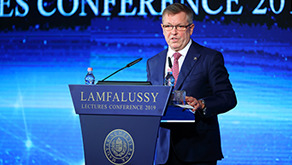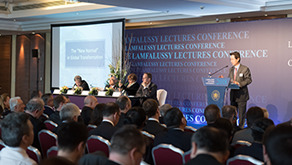ABOUT THE EVENT
PrintABOUT THE EVENT
Interviews and reports about the LLC 2020
NEW APPROACHES NEEDED TO TACKLE CLIMATE CHANGE, SAYS HUNGARY'S CENTRAL BANK CHIEF
China Global Television Network, 21th January 2020. Policy makers and banking bosses worldwide increasingly accept that protecting the evironment should be a responsibility of the financial system. That’s why sustainabilty was the focus at the annual conference of Hungary’s Central Bank.
Video Transcript
Policy makers and banking bosses worldwide increasingly accept that protecting the evironment should be a responsibility of the financial system. That’s why sustainabilty was the focus at the annual conference of Hungary’s Central Bank.
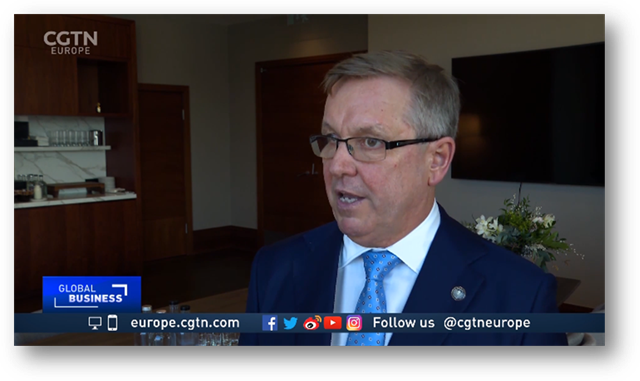 György Matolcsy, Hungarian Central Bank Governor: ”Long-term sustainability matters a lot. When it comes to climate change, social arrest, new macroeconomic challenges, we must build up a new approach, meaning that we have to focus on long-term sustainability.”
György Matolcsy, Hungarian Central Bank Governor: ”Long-term sustainability matters a lot. When it comes to climate change, social arrest, new macroeconomic challenges, we must build up a new approach, meaning that we have to focus on long-term sustainability.”
Hundreds of analysts and market participants heard the governor stress the importance of being able to wither economic and ecological crisis.
György Matolcsy, Hungarian Central Bank Governor: "We badly need new economic, financial, geopolitical approaches, and at the same time we had to face climate change challenges."
Those attending agree that economic growth relied on sustainability. ”We have to think about how the future can be lived without pollution, without the excessive use of energies and we have to employ all the means to support that our economy could be greener.” – Aniko Szombati, Chief Digital Officer, Hungarian Central Bank
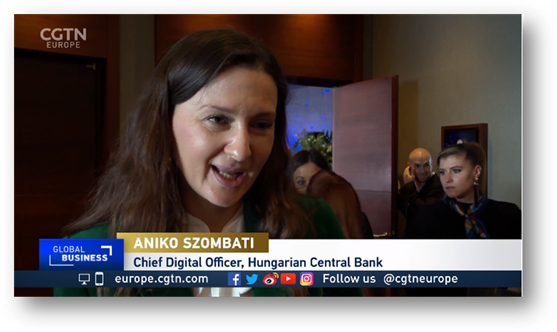
Experts say the economy is booming. ”Hungarian economy is strong, actually strong and GDP grows quarter after quarter and we have a stable budget balance.” – Csaba Lentner, Professor, National University of Public Governance
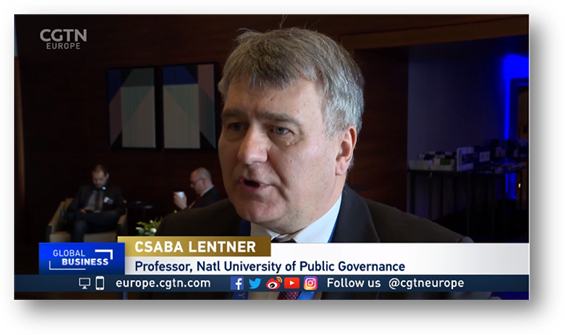
About that may be the case now, according to the top banking authority, the affects of climate change are looming large. György Matolcsy, Hungarian Central Bank Governor: ”It’s happening now. It’s happening and we are probably just at the beginning of the whole cycle.” The Central Bank Governor says European economies must reflect on new challenges that threaten the growth and stability and in this decade, he sees, a main challenge will be climate change.
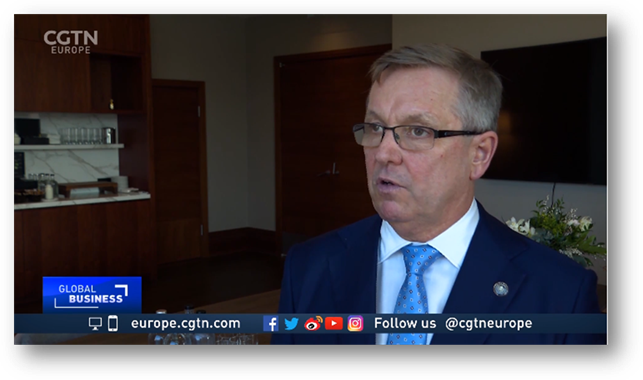
Isobel Ewing – CGT in Budapest: Hungary's highest banking authority has warned that climate change poses a threat to global economic growth. At a conference in Budapest, the governor of the country's central bank said the impact of climate change is already being felt, and banks and financial institutions should be focused on protecting the environment.
"We badly need new financial, geopolitical approaches ... and at the same time we have to face climate change challenges," said György Matolcsy. It comes as policymakers and banking bosses worldwide are increasingly accepting that protecting the environment should be a responsibility of the financial system.
Hundreds of analysts and market participants heard Matolcsy as he stressed the importance of being able to weather economic and ecological crises. Many of those attending the conference agreed with the banking chief that future economic growth relied on sustainability.
"We have to think about how the future can be lived, without pollution, without the excessive use of energies and we have to employ all the means to support the economy being greener," said one attendee of the conference. Matolcsy's speech coincides with this year's World Economic Forum (WEF) conference in Davos, Switzerland. The WEF's annual list of top five risks facing the world this year were all environmental issues.
Csaba Lentner, an economist at the National University of Public Governance, added that the Hungarian economy is booming. "The Hungarian economy is strong, the GDP grows quarter after quarter and we have a stable budget balance," he said.
But, while that may be the case now, according to the central bank governor, the effects of climate change are looming large. "It's happening now, it's happening and we are probably just at the beginning of the whole cycle," said Matolcsy.
PETER PRAET: THE INSTITUTIONAL WEAKNESSES IN THE EURO AREA HAVE TO BE URGENTLY ADDRESSED – NOVEKEDES.HU
The former chief economist and executive board member of the ECB told novekedes.hu that the Maastricht criteria are broadly useful but they cannot guarantee the sustainability of the monetary union. According to Peter Praet the importance of financial stability rules for the sustainability of the monetary union were underestimated from the beginning. This year we celebrate the 20th anniversary of the common European currency. What are the most important objectives that have met the original intentions of the „founding fathers”?
IMF: THE CONVERGENCE OF HUNGARY IS A SUCCESS STORY – VILÁGGAZDASÁG
IMF Director Poul Thomsen considers fiscal consolidation to be the key in the process of economic convergence. ”Hungarian GDP growth by far overrated the expectations of IMF and other international institutions. We were all astonished by the strength of Hungarian economy” – Poul Thomsen, Director of the European Department at the International Monetary Fund, said to Világgazdaság at Lamfalussy Lectures Conference.
THE FINANCIAL SYSTEM OF A TINY STATE SHIFTS TO BLOCKCHAIN WITH A SINGLE MASTERSTROKE - PORTFOLIO.HU
IMF Director Poul Thomsen considers fiscal consolidation to be the key in the process of economic convergence. ”Hungarian GDP growth by far overrated the expectations of IMF and other international institutions. We were all astonished by the strength of Hungarian economy” – Poul Thomsen, Director of the European Department at the International Monetary Fund, said to Világgazdaság at Lamfalussy Lectures Conference.
‘THE EUROZONE IS LIKE THE HOTEL CALIFORNIA – YOU CAN CHECK IN, BUT YOU CAN’T CHECK OUT’ – AN INTERVIEW WITH PROFESSOR BARRY EICHENGREEN - DANUBE CAPITAL
The National Bank of Hungary (MNB) dedicated the 2020 Lámfalussy Lectures Conference to sustainable convergence in Europe and Asia. They invited among other distinguished guests Professor Barry Eichengreen to give his thoughts on the topic. On this occasion Danube Capital R&A met Professor Eichengreen to discuss currencies, the future of the eurozone and ECB.
BARRY EICHENGREEN: NO NEED FOR HASTE IN EURO ADOPTION - G7.HU
„It is not all bad news that Hungary has been so far reluctant to introduce euro… for the Eurozone members and the Eurozone itself would need substantial reforms to make the monetary union function well. As regards the weakening of German economy, it’s high time Hungary should consider how the country’s economic dependence on Germany might be reduced.” – This and other topics were touched upon in our interview with Barry Eichengreen, professor of Economics and Political Studies at UC Berkeley (California) and former chief advisor to the IMF, whom we asked at Lámfalussy Lectures Conference, Budapest.
Report on the 2019 conference
On 4 February 2019, the Lámfalussy Lectures Conference was organised for the sixth time. At this year's conference, the world's leading financial experts and academic researchers examined the issue of convergence.
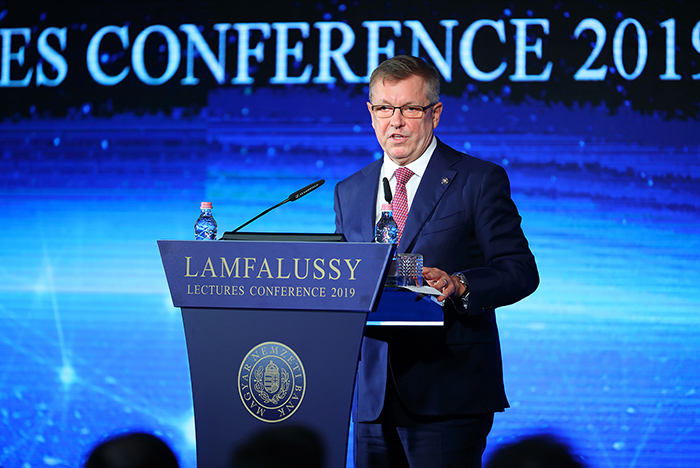
On 4 February 2019, the Lámfalussy Lectures Conference was organised for the sixth time. At this year's conference, the world's leading financial experts and academic researchers examined the issue of convergence.
In his welcoming speech, György Matolcsy, Governor of the Magyar Nemzeti Bank, first greeted Yves Mersch, winner of the Lámfalussy Award, Member of the Executive Board of the European Central Bank and former governor of the Central Bank of Luxembourg, as well as Katalin Novák, winner of the Popovics Award, Minister of State for Family and Youth Affairs at the Ministry of Human Capacities. In his lecture he outlined that the first stage of the euro convergence process lasting until 2008 had been successful. However, in the following period - lasting from the financial crisis to 2012 - convergence stalled and the structural problems of the euro came to the fore. Although the global financial crisis emerged in the United States, the crisis in the euro zone was deeper, longer-lasting and more painful than in the USA. In the third stage of the euro lasting from 2012 to date we see a slow recovery. György Matolcsy emphasised that it would be worthwhile to learn the following lessons from all this: 1) Longer and more dynamic boom periods are needed to achieve sustained convergence. 2) We need a fully-fledged euro and eurozone to prevent a possible future financial crisis. 3) We need appropriate crisis management mechanisms, quick and pragmatic crisis management based on experiences in the USA, as well as close cooperation between the government and the central bank. In respect of Hungary, he explained that although we are outside the eurozone, we are inside the European Union, and as Europeans we are entitled to have a vision on the future of the eurozone, since Hungary will join the eurozone in the decades to come. Finally, he outlined again that another financial crisis might happen in the future, when we will need quick and efficient crisis management. This will require efficient cooperation between governments and central banks so as to avoid budgetary restraints that may have severe impacts on society and long-term economic growth.
Ewald Nowotny, Governor of the Oesterreichische Nationalbank praised Yves Mersch in his speech, and in a historical context he provided a detailed presentation of his work and extensive experience, as well as his commitment to European and also to national affairs. Nowotny presented Mersch as a highly competent expert who is one the most deserving persons selected for the award, and whose thinking complies with the spirit represented by Alexandre Lamfalussy. Mersch is also a truly European thinker and an excellent role model. Reflecting on the conclusion of György Matolcsy that there were ups and downs in the last two decades, he said that without the ECB it would have been much more difficult for small countries in the European Monetary Union to tackle the crisis.
In his speech, Yves Mersch, Member of the Executive Board of the European Central Bank and former governor of the Banque centrale du Luxembourg, praised Alexandre Lamfalussy, whom he saw in different roles in the last 30 years of his life, and he always admired his outstanding precision and professional competence. The main topic of his speech was the changing role of central banks.
The design of the modern central bank dates back to the consensus around the disinflationary path of the 1980s that central banks should be independent and have a narrow mandate restricted to focusing on the fight against inflation. In Europe, there was a second layer of consensus on how to share tasks, and how to allocate what is done at a national and regional level. Although political considerations relating to shared sovereignty also supported the monetary institutional setup, economic and fiscal issues were left to coordination and some common rules. This created a breeding ground for critics. Problems were exacerbated by the failure of economic cooperation, and the European Commission changed too: from a technocratic body it turned into a political one. The biggest test was the great financial crisis which is still shaking the foundations of our societies today. Major changes took place in monetary policy implementation during the crisis in the context of instruments, communication and accountability. In terms of strategic thinking and interaction with various policy fields, the biggest change concerned financial stability and macroprudential policy. In 2010, Alexandre Lamfalussy called for central banks to not regard their macroprudential duty as being less important than maintaining price stability. In conclusion, Mersch argued that the best solution is to integrate financial stability concerns into monetary policy at the European level, including possible corrections with instruments at national levels.
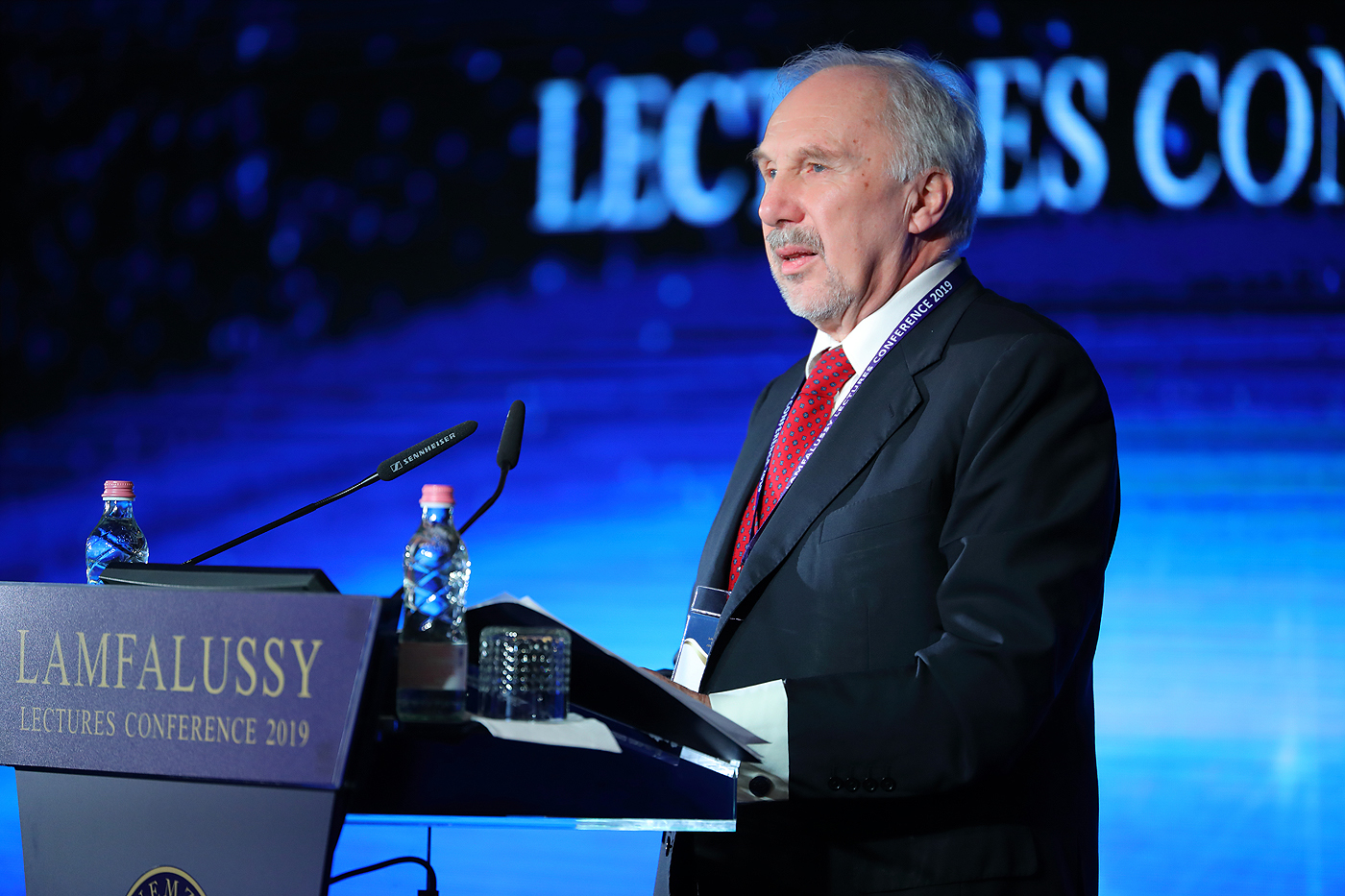
Morning session: “The decade of convergence in the EU”
The moderator of the discussion forum was György Szapáry, Chief Advisor to the Governor of the Magyar Nemzeti Bank, who provided a brief introduction to the subject, saying that the share of Southeast Asian countries in world GDP was four times higher in 2017 than in 1990, and China's share is continuously increasing. Of the 28 Member States of the European Union, the eight Central and Eastern
European countries are experiencing slow but continuous convergence. Europe's share in world GDP is declining more rapidly than the share of the USA. Eleven of the world's top 20 high tech companies are American, nine are Chinese, and there are none from Europe. Innovation and technological development will be key competition factors in the future (in particular regarding artificial intelligence and robotics). Europe must improve its education system. The PISA surveys clearly reveal the outstanding performance of Asian countries.
Lúcio Vinhas de Souza, Head of the Economics Team at the European Political Strategy Centre (EPSC) of the European Commission, talked about reviving convergence. Although the EU remains a “convergence machine”, and one can see increasing standards of living in Member States, we need to do more. Central European countries have achieved real convergence, but they are facing new challenges that they must meet to continue this process. Central European Member States are also performing relatively well in macroeconomic terms. Although non- euro-zone members could easily meet most of the accession criteria, he thinks that Central European Member States will remain among the least competitive economies of the EU. The quality of governance remains below the EU and eurozone average, and in fact is becoming a little poorer. Adequate institutional capacity is crucial. A favourable investment environment requires quick and efficient administrative procedures, reliable and accessible data, legal certainty and planning capacity. The efficient functioning of domestic markets is also dependent on factors like the rule of law, quality and efficiency of institutions. If these are not adequate, it may lead to an outflow of capital or a lack of domestic and foreign investments. For some Member States, labour costs exceed productivity growth, which results in a decline in relative competitiveness, and investments largely depend on the EU Cohesion Fund. From the perspective of sustainable convergence, financial stability is crucially important. This has particular significance for euroised financial systems in Central Europe. On the whole we may conclude that there is economic convergence in the region, but there is a need for adjustments in a number of areas. The EU will always be a partner for dialogue in this field.
William R. White, former chairman of the Economic and Development Review Committee at the Organisation for Economic Co-operation and Development (OECD) and former economic advisor to the BIS, lectured on the decade of catching up within the EU. As regards convergence in the pre-crisis period, he said it was difficult to measure convergence. Not only per capita GDP is important, but well- being, too. Convergence slowed down after the crisis, as did the process of legal and institutional reforms. It is important to maintain the achieved results. Strong institutions and confidence facilitate cooperation, avoiding disturbances. There needs to be more focus on crisis prevention management and resolution. Preventive measures must be taken to handle domestic problems. He highlighted the excessive increase in private sector debt. Macroprudential policies are important, but there is no magic bullet. At the same time, the points of particular importance include long-term reforms in the budgetary framework, the support of domestic (local currency) capital markets and the continuation of the intensive legal and institutional reforms. Central and South Eastern European countries will not be able to avoid many external problems either (trade war, Brexit, weakening global economic growth) if they occur. In any case, it is worth preparing ourselves for tougher times, putting measures on improving crisis-management mechanisms in the forefront, and generally focusing on creating confidence and systemic resilience to remain capable of attracting investors and continuing with convergence.
Christian Kopf, Managing Director at Union Investment Privatfonds GmbH, emphasised the importance of the European integration process and institutional system. Recalling the four freedoms embedded in the Treaty of Rome, he commented on their impacts on the economic convergence of Central Europe. On the free movement of people he remarked that in some cases this might have a negative consequence: young, highly qualified people leaving Central European countries. In terms of the labour shortage, Hungary has two options: a low growth path or inflows of foreign labour. He believes that the reason why Hungary was hit more severely by the crisis than the Czech Republic or Poland is partly because the yields of Hungarian government securities were higher. Another important factor was that due to the free movement of capital, Member States could not introduce limitations on capital flows during the financial crisis. The free movement of goods and services was one very positive element in the economic integration, particularly in terms of participating in supply chains.
Povilas Lastauskas, Director of Centre for Excellence in Finance and Economic Research at the Bank of Lithuania gave his personal opinion - 25 years after Maastricht - on the heterogeneity and convergence in the European Union. According to his calculations, 26 countries are approaching, albeit slowly, the same equilibrium level of real GDP per capita, and there is almost overall convergence in the EU. There are wide and persistent differences in terms of real labour productivity. Although there is some convergence at the macro level, there are more significant differences at the regional level where there is a lower degree of convergence. He finished his presentation by asking about the regional dimension, even if there is convergence at the macro level. Is it sufficient to track aggregate convergence?
Afternoon session: “The decade of convergence in Asia”
The afternoon session started with the keynote speech of Kairat Kelimbetov, Governor of the Astana International Finance Centre (AIFC), former governor of the National Bank of Kazakhstan on the subject of the cooperation between Europe and Asia. First he drew attention to the shift of power in the global economy, where the economic and political centre has shifted and is expected to further shift from the Euro-Atlantic power centre to Asia. During recent decades the economies of Asia have undergone enormous change. According to some forecasts, China will become the world's largest economy by 2050, with India in second place, and the USA will only be third. The Asian market comprises 62 per cent of the world's population. In addition, substantial industrialisation and urbanisation processes have taken place in China and India. China is also a leader in terms of the future, being a global force in the digitalisation of the world economy (e.g. in e-commerce and FinTech). A number of Chinese companies have developed to such an extent that they are competing with Silicon Valley companies. In Davos, special attention was paid to the topic of U.S.-China competition, in particular in the field of artificial intelligence. The reason for the success of Asian countries lies partly in their approach to innovation, in their demographic trends, and partly in the prudent regulatory environment and institutions. We need to focus on how to facilitate the financial connection between the European and Asian markets. Central European and Central Asian economies may play a key role in creating this connection.
The moderator of the afternoon discussion forum, Dániel Palotai, Executive Director and Chief Economist of the Magyar Nemzeti Bank, highlighted in his introduction to the debate that the global world order has changed. The evolution of new economic centres and the rebirth of the ancient trading routes have created a multipolar world order, in which Asian countries are becoming more and more important. Furthermore he confirmed that Hungary acts as a bridge-builder between the East and West. For the future, he emphasized that by 2030 three of the four largest global economic powers might be in Asia. Turning to competitiveness, he said that there is a considerable competitiveness gap across regions. In 2018, based on World Economic Forum survey and the IMD World Competitiveness Center's research three or two of the ten most competitive economies in the world have been Asian economies, respectively, while the others are European and North American. Policies aimed at boosting competitiveness have served for them as a basis for convergence. This is a major lesson for Hungary too.
Denis Hew, Director of the Asia-Pacific Economic Cooperation (APEC) Policy Support Unit, examined the catching-up decade of the Asian-Pacific region from the perspective of the APEC. The APEC is an informal, non-binding, consensus- driven forum with 21 member countries. It works towards achieving free trade and making investments in the region. The APEC region's GDP growth has consistently exceeded the world average since the crisis, and the APEC members' share of world GDP and trade is continuously growing. However, a study demonstrated that due
to geopolitical tensions, trade is no longer considered a reliable driving force of APEC's economic growth. The opportunities of the digital economy - particularly e-ecommerce - the development of green technology, an increase in green-field investments as well as implementing reforms that improve productivity in education, health care and other social services, encouraging innovation, narrowing gaps in infrastructure and promoting women's participation in economic activities will likely be the engines of growth in the future. Current issues affecting future growth are as follows: demographic problems (aging population, distribution of resources to prepare for solving key economic issues like the lower labour supply and higher healthcare costs), issues relating to digitalisation and employment (medium- qualified jobs can be replaced with computers), and workplace polarisation (as most mid-skill routine jobs are being computerised, only non-routine and discretionary jobs are left at the low and high end of the skills spectrum). Furthermore, natural catastrophes and diseases may negatively affect future growth, since the need to provide temporary shelters and transitional livelihoods entails a significant budgetary cost. In his closing remarks, he said that APEC was developing a new vision for the future for the post-2020 period. It already takes into account the new trends and challenges: growing trade protectionism and tensions, tackling non- customs barriers and structural reforms, geopolitical risks, structural unemployment due to digital technologies and artificial intelligence, inadequate skills, issues relating to the middle income trap such as moving up the technological ladder, the environmental effects of fast industrialisation and urbanisation, anti-globalisation opinions and increasing inequality.
Khee Giap Tan, Co-Director of the Asia Competitiveness Institute of the National University of Singapore, Associate Professor at the Lee Kuan Yew School of Public Policy, and Chairman of the Singapore National Committee for Pacific Economic Cooperation (SINCPEC) talked about the East Asian economic development model, some elements of the One Belt, One Road Initiative, and the consequences of the US-China trade war. First, he provided a quick and updated overview of global economic development trends in respect of the US-China trade war, indicating that growth in the Asian-Pacific region is still expected to be higher than in developed economies, while the slump in the growth rate will remain marginal and decrease less than in developed economies. The second part presented the East Asian economic development model (EAED) for resolving bottlenecks. The experience and success of the robust EAED model show that overcoming the production bottlenecks through investments aimed at resolving production bottlenecks is a pre-condition for an economic recovery, and a useful tool for escaping the middle income trap. Effective leadership and good governance clearly have a prominent role in facilitating infrastructure investments. The third part was about the facilitation of regional and bilateral free trade agreements and the fact that OECD economies are still very important for the ASEAN states. In the fourth part, the lecturer addressed the importance of the ASEAN area in respect of the fragmentation of production in global value chains, and the transfer of production from China to ASEAN economies. Then he talked about the opportunities offered by China's One Belt, One Road Initiative for Hungary and Eastern Europe. As he said, Hungary can explore the opportunities provided by the One Belt, One Road Initiative if the government does not leave it to the market but takes over the duties of this project. Finally, he presented Singapore as the infrastructure centre of Asia, focusing on the cross- border cooperation in infrastructure development, investments and finance.
In his lecture Hyeonjung Choi, Director of the Centre for Global Governance at the Asan Institute for Policy Studies and a research fellow at the Asan Institute for Policy Studies pointed out what we can learn from the East Asian catch-up economies. Since the end of the 1980s these economies have continuously achieved higher growth rates than the world average, and to an increasing extent. He presented the features of the East Asian catch-up countries: the dominance of state bureaucracy and economic policy, the control of the domestic market, the “revolving door policy” of business and industry associations, the focus on selected key industries, the central role of finance, and the export-led strategy. He then went on to list the favourable external conditions for convergence: the Cold War era provided a kind of security umbrella, financial and technological support when a wide range of new market opportunities opened up for the allies. The existence of the American and liberal economies, the robust economic growth of the great powers in the 1960s to 80s, the target countries of the export-oriented economy, the accepted political intervention of authoritarian regimes in the economy, the onset of the era following the Cold War, and the twin deficits of major importers - all this stimulated growth.
His lecture continued with the challenges that catch-up economies face in the 21st century. The world market has become more mature, competitive and liberalised. In addition, free-trade rules and free market economies have also changed. The industry is undergoing a paradigm shift too. New enterprises with increasing profits are emerging, while the manufacturing industry is less profitable. “Sustainable development” has become the creed, including economic growth, environmental protection and social justice. He closed his presentation by drawing conclusions from predecessors' development: first he highlighted the important role of the government: it is necessary to create a future-oriented growth vision, well-defined national competitiveness, and well-structured, long-term objectives and industrial policies. Secondly, there has to be consensus on national economic development: it is necessary to have a well-supported political system and leadership, as well as a fair distribution of the national wealth. Thirdly, it is necessary to support the enterprises that generate increasing profits, as well emerging sectors. Fourthly, the liberal international order and markets must be utilised. Finally, environmental degradation must be avoided, and sustainability must be a priority.
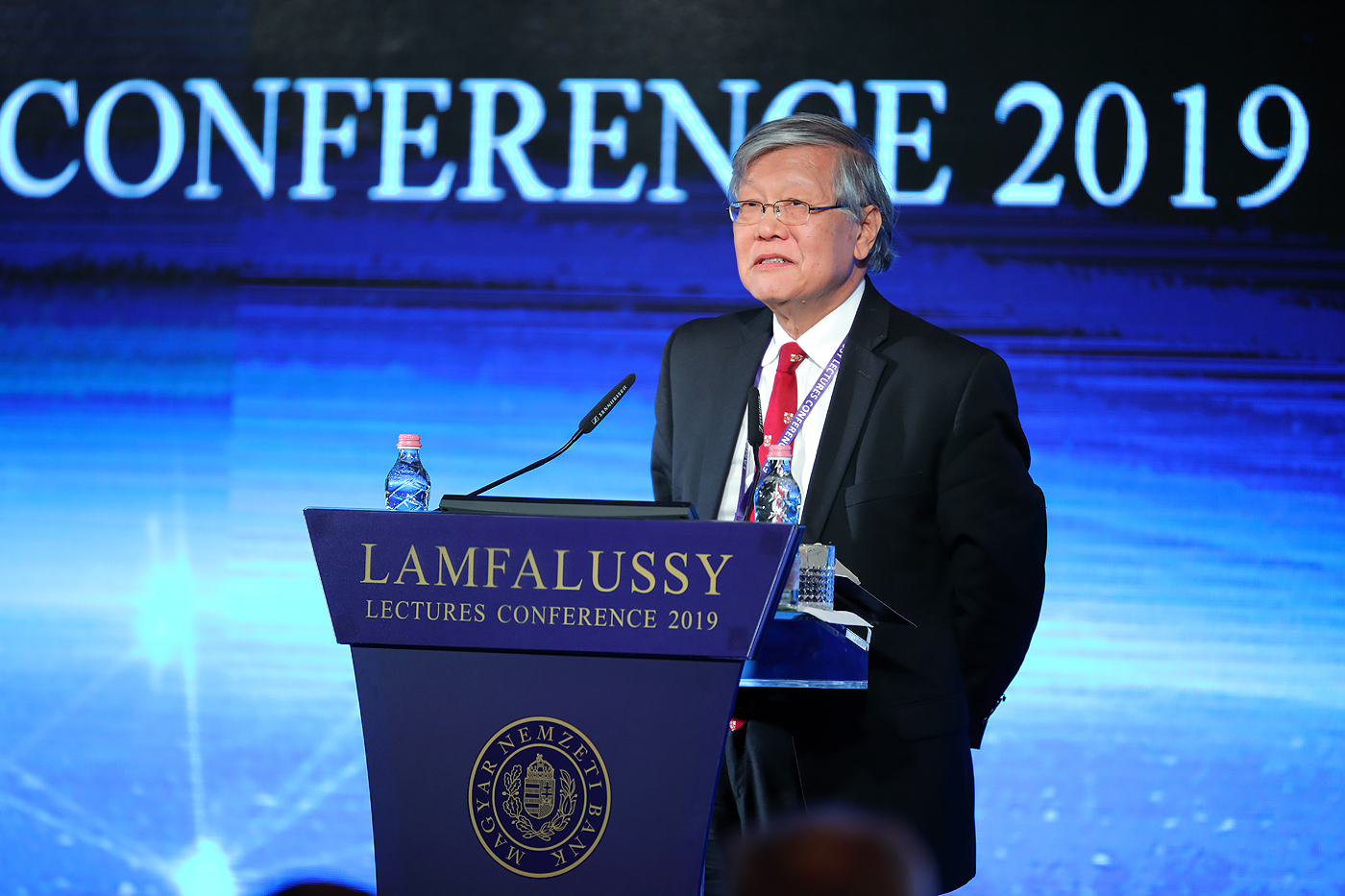
Andrew Sheng, Distinguished Fellow of the Asia Global Institute at the University of Hong Kong and former Chairman of the Hong Kong Securities and Futures Commission viewed Asia from the perspective of a global system. At the beginning of his speech he paid tribute to Alexandre Lamfalussy. He considers Hungarian economists to be the best economists in the world, and as he sees it, the best ones work at the central bank. He believes that megatrends signal a paradigm shift, a move away from the neoliberal order, but the transition will be very chaotic. From a macroeconomic aspect, geopolitical risks will exceed financial risks. He mentioned six disrupting megatrend factors: the shift from a unipolar towards a multipolar world; the geographical shift from West to East; the shift in gender roles (women are getting richer and earning more and more); the shift of generations (the young facing a future without jobs); climate change (shortage of water, food and energy); and the technological shift which entails jobs and creative disruption. Even one single factor is extremely complicated. Moreover, each factor interacts with the others, and thus may result in very complex outcomes. This poses enormous challenges for politics, as well as for business models, since the policy of “America first” does not create a level playing field. The next topic touched upon the emerging opportunities and threats, and the issue that the strengthening of the US dollar, the trade war, and the whole neoliberal thinking endangers sustainable prosperity. If the US dollar strengthens, emerging economies suffer from enormous liquidity pressures. The trade war constitutes a setback - not only for trade itself. Another big question is who will implement the 5G technology. Finally, referring to the Hungarian economist, Karl Polanyi, he said that it had become clear that market self-regulation did not work and this might erode human society and destroy nature.
In his closing words, György Matolcsy thanked participants for their very high quality and exciting presentations and inspiring thoughts, and expressed his hopes that the collective thinking on the new paradigms that determine future development would continue within the framework of the Lámfalussy Lectures Conference.
Report on the 2018 conference
In 2018, the Lámfalussy Lectures Conference was staged for the fifth time. Under the title “Great Transformations”, the 2018 event featured leading financial professionals and academic researchers from all over the world, focusing on major transformations taking place across the globe, with particular emphasis on the shift in the weight of the world economy towards the East.
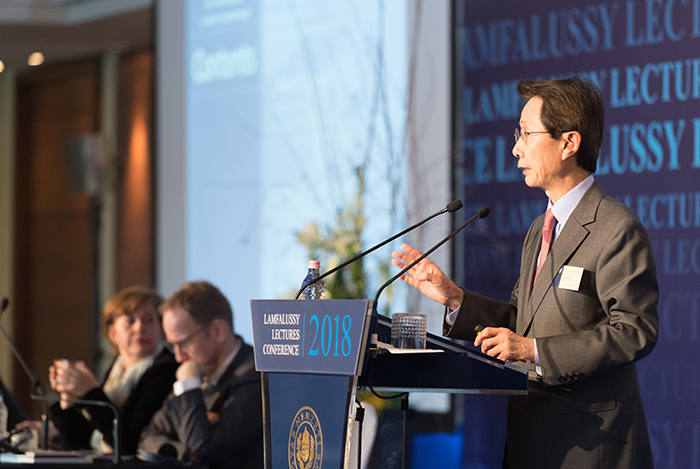
The opening address was given by Governor György Matolcsy, where he pointed out the major transformations we are witnessing in the world, the EU, and Central and Eastern Europe. A new wave of globalisation is underway, one of the main drivers being technologies such as 3D, robotics or artificial intelligence; additionally, future developments will be shaped jointly by economic policies, monetary policies and geopolicies.
Following the Governor's address, the Deputy Governor and two Executive Directors of the Magyar Nemzeti Bank gave an account of the transformation that has taken place in the Hungarian economy over the past few years. MNB Deputy Governor Márton Nagy gave an overview of twelve areas in which the Hungarian economy was stabilised by the action taken, including the labour market, the tax regime, the system of incentives, public finance, public debt, public deficit (EDP procedure), monetary policy, lending, the foreign exchange structure of consumer lending, the central bank balance sheet, economic growth and convergence. The measures have laid down not only the foundations for sustainable growth but also significantly reduced Hungary's vulnerability, and this may become particularly valuable in more turbulent future periods.
MNB Executive Director and chief economist Dániel Palotai presented the measures taken by the targeted and innovative central bank policy in recent years. The base rate has reached a historical low, and inflation is currently below the central bank's 3 per cent target, which justifies maintaining accomodative monetary conditions in the future. In this context, the MNB decided to apply targeted nonconventional measures. The central bank's Self-financing programme has helped reducing the share of FX-denominated public debt from 50 per cent to below 22 per cent, which decreases further over the forecast horizon and demonstrates good cooperation between the two branches of economic policy. The central bank's Funding for Growth Scheme was necessary to avoid a credit crunch and reach a turnaround in lending. The integration of the financial supervisory authority into the central bank has given the MNB more objectives and a greater variety of tools at the same time, the scope of the central bank supervisory function includes the regulation of macroprudential, microprudential and resolution areas, which in turn led to a more stable financial system.
MNB Executive Director Barnabás Virág presented the key pillars of sustainable convergence. The initial years of the period dating from 2010 were characterised by efforts to decrease vulnerability and bring about a turnaround in fiscal and monetary terms, with growth driven by improved labour intensity, i.e. an increase in the employment rate and tax reforms to provide incentives for work. Going forward the focus will be on capital-intensive growth, including greater productivity, improvements in competitiveness, research and development, better trained labour, innovation and creative industries. The country is facing multiple parallel challenges: demographic trap, global lack of skilled labour, the trap of low domestic value added, duality and financial trap, and weak social cohesion. However, new global megatrends: the rise of global middle-class, the scarcity of essential resources, urbanisation, industrial revolution 4.0-5.0, new forms of globalization, fundamental changes in the energy-mix, modern infrastructure, the new global economic map and the age of low interest rates. The 21st century provides new interfaces though, like biotechnology, e-mobility, digitalisation, robotisation, fintech, recycling, tourism and the health industry. Through growth-friendly policy, continued tax reforms and wider e-government, the State is providing the foundations to hold up the five pillars of human capital development, industry and export strategy, innovation capabilities, modern infrastructure, and geostrategy; these pillars are associated with competitive financial intermediation. This is an opportunity for the country to be a bridge between China and the West.
Morning session: “Great Transformation: East”
The talks of the MNB executives were followed by a keynote presentation by Li Yang, President of the Institute of Political Science at the Chinese Academy of Social Sciences, on China's deleveraging. Li Yang pointed out the fact that deleveraging is a challenge not only for China but throughout the world. Although countries worldwide committed themselves to reducing debt in the aftermath of the crisis, debt has continued to increase globally due to the headwind that deleveraging has been creating to economic stimulus. China's debt as a percentage of GDP is not particularly high in an international comparison, given the higher level of aggregate debt in a number of developed economies, including the US, Italy, France, the UK and Japan. Other than debt to GDP, it is appropriate that the balances of the economies are also taken into account, considering both the liabilities, i.e. debt, and the assets that an economy has. In China, a major part of debt has been used to finance investments. China's public assets are estimated at USD 35.8 trillion and its liabilities at USD 20.3 trillion, providing public equity of an estimated USD 14.6 trillion. China is pursuing the broader objective of economic growth, one pillar of which is financial stability and therefore the management of financial risks, as part of which China has committed itself to economic deleveraging at the highest political level. In terms of deleveraging, favourable trends can be observed in the corporate and public sectors, while consumer lending continues to grow for the time being.
In her talk, Senior Fellow Alicia García-Herrero from European think tank Bruegel discussed the question of how Europe could open to the East in a 21st century that will likely belong to Asia. Europe is seen as increasingly small from an Asian perspective. Virtually all aspects of global growth between 2015 and 2025 may be dominated by Asia, which is expected to account for 63 per cent of economic growth, 60 per cent of the middle class globally, and approximately 40 per cent of the 500 largest corporates of the world in 2025. China and India are becoming the two main economies. The EU's relations with China may be crucial for the EU to be able to benefit from Asia's century. For the time being though, Europe has a significant trade deficit with China. A breakthrough could be provided with the export of services; but the share of the segment remains small and so it needs to be increased. While major growth potential can also be identified in foreign direct investments, efforts are still needed to create a more level playing field and to clarify the rules, and in addition a bilateral investment agreement might be appropriate.
Park In-kook, Chair of the Korea Foundation for Advanced Studies, discussed the new characteristics of global changes. The first key change is the political transformations taking place worldwide. While the advances made in the fields of democracy, free trade and globalisation used to be seen as a unidirectional process, more authoritarian political forces have gained ground in a number of countries. Another important change has been the shift in China's attitude to global developments. Up to 2009, China had simply taken an open stance, whereas since that year it has become increasingly resolute in asserting its interests, which is more likely to lead to a conflict with the United States. The third key change is the potential spread of nuclear weapons. The emergence of North Korea as a nuclear power could drive other countries in the region, such as South Korea, Japan or Taiwan, to build up sufficient retaliation capabilities. Within the fourth group of parallel developments, mention should be made of the drawbacks of globalisation that are felt on a large scale, including the destabilising effects of dependencies, weakening national independence, increasing wealth inequalities, and the growing power of monopolies; among other things, these developments contribute to further impetus for protectionism.
Lawrence J. Lau, Professor at the Lau Chor Tak Institute of Global Economics and Finance of the Chinese University of Hong Kong, confirmed the trends described previously, i.e. that while Europe and the United States are losing their prominence in the world economy, Asia is gaining. A number of Asian countries emerged after WWII. The talk explored the common characteristics that facilitated the convergence process. The argument highlighted the shared features of high savings rates, a significant volume of available labour, an increased commitment of resources to research and development, ensuring macroeconomic stability, economies opening up and becoming export oriented, and continuity in political governance. Apart from potential drawbacks, a constant governing power may provide a number of benefits, including the continuity of economic policy, and greater predictability for the private sector.
In his talk, Renwei Huang, former Vice-President of the Shanghai Academy of Social Sciences, currently Chair of the Academic Committee and a Senior Fellow for international strategic studies, gave a summary of the development and characteristics of the Belt and Road Initiative. The Initiative was announced by China's president, Xi Jinping in 2013. The Asian Infrastructure Investment Bank (AIIB) and the Silk Road Fund were set up by 2015. In November 2017, the 19th National Congress of the CPC also confirmed the importance of the Initiative. According to the participants' shared vision, economic globalisation is entering a new phase, there is a need to discover a new way of global governance, a new infrastructure network may be established between Europe and Asia, there may be shifts in the weight of industrial chains and departments and in the weight of international capital flows, while the new structure may require both bilateral and multilateral cooperation, and international business may need new rules based on a mutual understanding between cultures. The new regime offers plenty of opportunities for acceding countries; for example, benefits are currently available to Central and Eastern Europe through infrastructure investments. According to the lecturer, the gradual approach to progress may be effective. However, it is worth noting that the regime is very much influenced by specific characteristics of Chinese culture, such as building bridges before riches, giving more and taking less, avoiding pressuring others in fields that we do not want for ourselves, or preference for internal improvement over external change.
Afternoon session: “Great Transformation: West”
The afternoon session opened with an address by the Central Bank of Poland's Governor Adam Glapinski. In a changing world, it is important for a central bank to act as an anchor of stability, and not to overreact the momentary volatile movements of the markets. In Poland, the base rate has remained constant at 1.5 per cent for around 3 years. Over these years, the central bank has come under multiple pressures, initially towards easing and then towards tightening; however, it resisted and pursued a consistent policy of no change, which it saw as the best way to achieve its objectives. While a constant policy rate may superficially appear old-fashioned and boring, council members in fact considered the options at each rate-setting meeting, yet each time, based on the analyses available, the central bank came to the conclusion that the best option was no change. The results of recent years have confirmed the central bank's position.
In his keynote address as Chair of the afternoon session, György Szapáry, Chief Advisor to the Governor of the Magyar Nemzeti Bank, pointed out the need for the renewal of the EU and the euro area in order to increase their resilience and improve their operations for the long term. While consensus has been reached over certain issues such as the completion of the Banking Union and the establishment of the Capital Market Union, or the transition from ESM to EMF, opinion has remained strongly divided regarding numerous other key matters, i.e. expanding the ECB's lender of last resort role, tax harmonisation, eurozone budget, financial incentives for joining the eurozone, EU enlargement to offer membership to Balkan countries. Szapáry demonstrated that growth in the EU is being driven by new Member States, given the significant transfers of human resources from the CEE to western Member States. He added, that besides these, the European Union must face other challenges, such as Brexit, migration and a two-speed Europe.
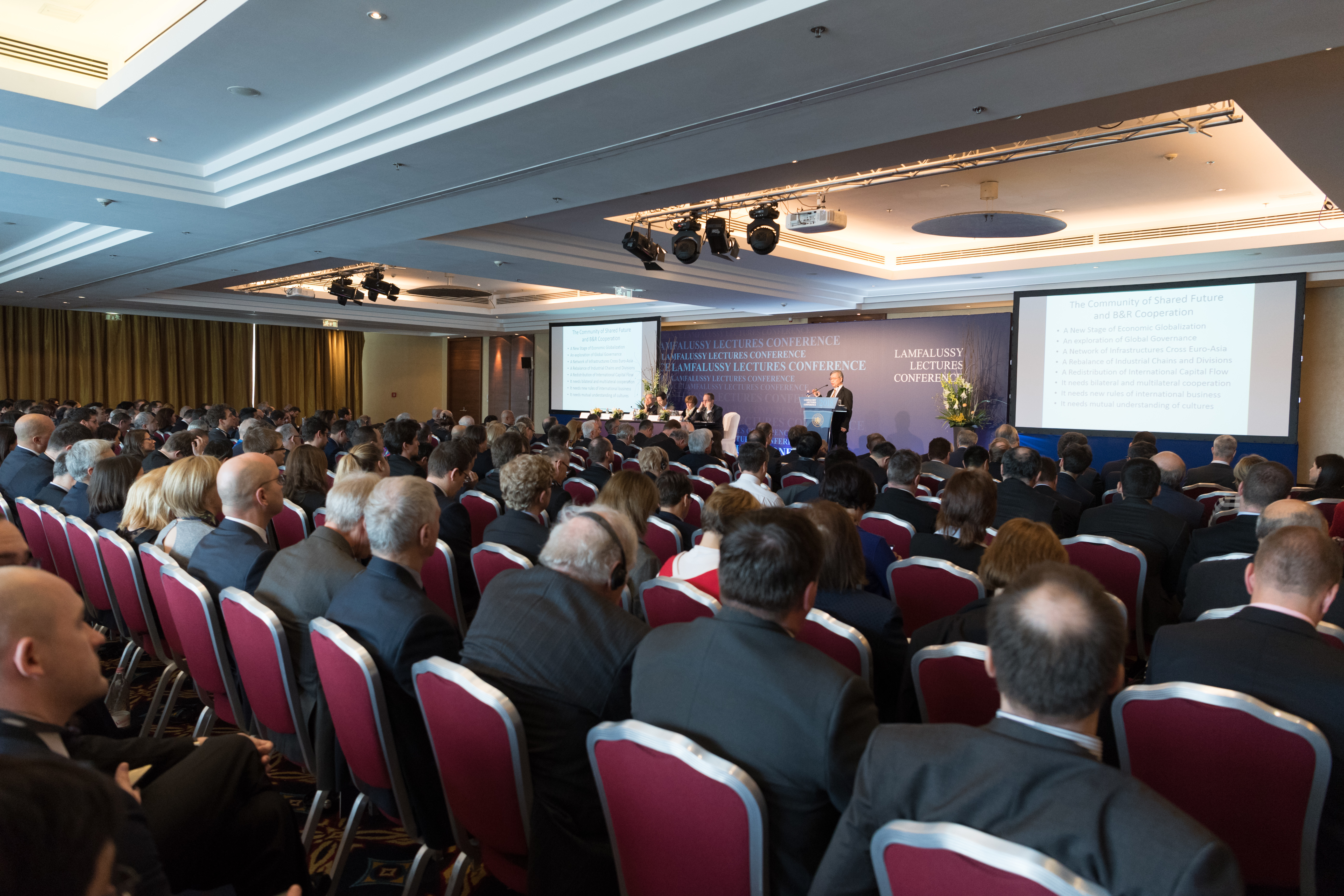
Former President of the Eurogroup Working Group and of the EU Economic and Financial Committee, Thomas Wieser, underlined the pressing need for deeper integration within the EU due to the developments previously explained, i.e. the shift in the weight of the world economy towards the East. Strengthening the internal market is a prerequisite for ensuring the EU's greater weight internationally, in the meantime though, Brexit poses the risk that the EU's international weight will diminish further. Apart from external challenges, the EU also needs to respond to many internal challenges such as the division of opinion between North and South, low productivity, and the efficient distribution of responsibilities between Brussels and nation states. At this point, many of the major global issues are being answered without any EU involvement; EU Member States are small in a global sense, but may be strong if united.
Marco Buti, Director-General for Economic and Financial Affairs at the European Commission, thinks that it is early to lament over the decline of Europe. We should not underestimate ourselves, as current developments in the economy are favourable and enable sufficient progress to be made on integration for Europe to rise to international prominence. EMU must deal with its internal issues as the current status is unsustainable: there is a need for a more appropriate distribution of risks to individuals and communities, monetary policy is overburdened, the adjustment mechanisms are insufficient and there is no central fiscal stabilisation function. Regarding a financial union of greater depth, the most urgent priority for EMU is to establish the Banking Union and the Capital Market Union, as the mitigation of income shocks via financial markets remains low. One advantage of a fiscal union is that it may improve the resilience of the economy and the ability of the region to stabilise itself. The achievement of stronger economic and fiscal cooperation may be followed by further efforts to deepen cooperation on institutions and governance.
Reza Moghadam, Vice-Chairman for Global Capital Markets at Morgan Stanley, argued that Brexit was in fact the result of the UK's identity crisis. Currently the UK lacks a clear consensus on the nature of the relations it should have with the EU; moreover, power is being held by a minority government, which makes virtually any outcome possible as regards Brexit negotiations: a beneficial agreement, a so- called hard Brexit, or even a new referendum. Despite the uncertainty over the short-term outlook, he considers the UK economy to be resilient in the longer term. Business requires clear perspectives and a legally enshrined vision for the sake of predictability.
John Lipsky, a Senior Fellow with the Johns Hopkins School of Advanced International Studies, and former first Deputy Managing Director of the International Monetary Fund, addressed EU developments from a US perspective. He explained that despite the criticism voiced by some US economists about the construction of the euro, it was mostly welcomed by participants in the business community. While a single currency may support the deepening of the single market, there would be benefits in knowing the EU's ultimate intentions concerning a deeper union. The EU banking system was deeply hit by the crisis, which may call for a more effective distribution of risks and a greater degree of federalism. The Banking Union and the Capital Market Union could be game changers.
The conference was concluded with a few words of thanks by Governor Matolcsy. He pointed out that while the conference talks highlighted the major transformations taking place worldwide, there are deadlocks in other fields at the same time, such as Brexit or the relations between Brussels and the V4. He proposed moving forward out of these situations, calling for new visions, strategies and structures. In view of the unpredictability of the future, several visions may co-exist, and the next conference may provide a good opportunity to discuss them.
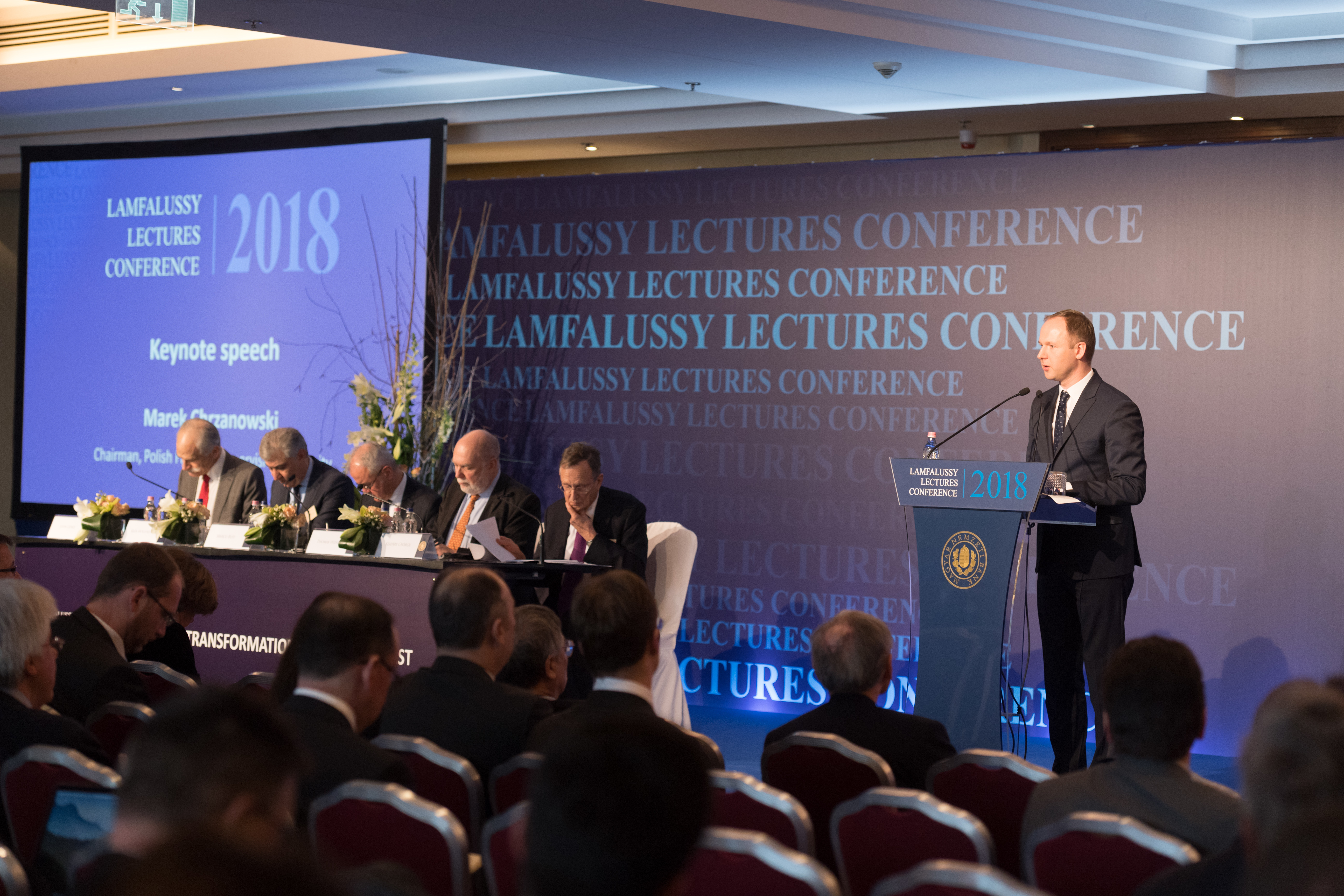
Report on the 2017 conference
On 23 January 2017, the Magyar Nemzeti Bank organised for the fourth time the meeting entitled Lámfalussy Lectures Conference, with about 450 participants, in commemoration of Sándor Lámfalussy, an outstanding European economist of Hungarian descent. Several renowned economists, politicians and representatives of the business sector participated in the conference - including Prime Minister Viktor Orbán, Jacques de Larosiere, former Managing Director of the IMF and former Governor of the Banque de France, former president of EBRD, Tien Gouli, Chairman, Bank of China Ltd. and Sir Paul Tucker, former Deputy Governor of the Bank of England.
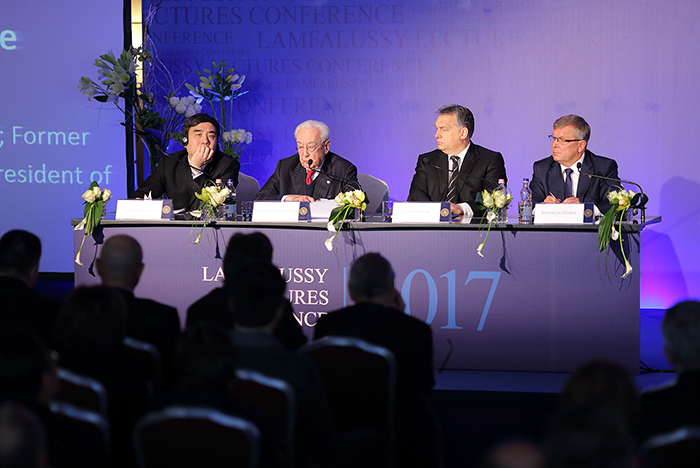
In his opening speech, György Matolcsy, Governor of Magyar Nemzeti Banknoted that the purpose of the conference was to build strong political, intellectual, economic, financial and human bridges between Europe and Asia, more specifically between the European Union and China. Europe is a strange continent: over the last 500 years a unique European success story has been built. However, in the first half of the last century we devastated Europe, in the second half we managed to rebuild it and to develop very strong cooperation in the framework of the European Union. The introduction of the euro started out as a promising venture, and at first it proved to be a great success, but after 2008 it turned out that huge mistakes had been made in the European Union and in the euro zone. As a result, the vision of the future of the European Union was shattered, and many jobs were lost. The position of the common European currency was also weakened, and one of the reasons for this weakening is rooted in the economic policy of the European Union. Sándor Lámfalussy emphasised the importance of financial stability several times, which is strongly required in order to ensure growth and create jobs, so we can rebuild the future of a crisis-torn Europe. However, this should not be accomplished by introducing austerity measures, because such measures lead to loss of jobs and the lack of GDP growth and loss of trust, resulting in an unsustainable macroeconomic course. We need financial stability in order to rebuild Europe and make the euro successful, so that we once again should have economic growth, a European vision of the future and jobs. The main message of the opening speech is the recommendation that we should build strong bridges between Europe and Asia, primarily with China. One of the beneficiaries of the “One Belt, One Road” concept of China could be the European Union, within that the Central East European region, and especially Hungary.
Concerning the future of European integration, in the opinion of Jacques de Larosiere we are lacking a long-term vision of the future, a clear strategy. We need more powerful convergence, homogeneity among members of the euro zone in terms of economic performance, since at present their indicators of competitiveness are substantially different. For that purpose a “Ministry of Convergence” should be set up, which would promote implementation of the required economic adjustments. The European Union is not capable of levelling off the structural disparities among the member states. This could have been an aim, but it was excluded at the very beginning, although at least a minimum level of consistency is very important and should be one of the pillars of the European Union. The real question is whether the European system sounded the alarm bells in time, to warn about the problems. The answer is: no, this did not happen, despite the warning statements of ECB. Finally, the market signals triggered reactions, but too late. In total, the convergence of the member states of the European Union is a failure. We do not need a Europe where the volume of regulations keeps rising and the investors are burdened with more and more constraints, but rather one where capital may flow freely in both directions. In addition, it is important that we cannot request additional fiscal austerity in countries where unemployment is already high.
In his lecture Tien Gouli, Chairman, Bank of China Ltd. said that the “One Belt, One Road” initiative of China offers a vision of the future and several opportunities. It connects two markets of outstanding importance. On one end Europe can pride itself on its developed technology and great experiences, on the other end we have Asia with its fast growth, huge demand and ample labour force. They mutually complement each other, and once these two markets have been integrated, it will become the longest economic corridor of the world, with the largest potential. This initiative was suggested by Chinese President Xi Jinping in 2013 and was also highly appreciated by the UN. Hungary was the first European country that signed the relevant cooperation agreement with China.
The first priority area is infrastructure, with the purpose of implementing infrastructure connections. He highlighted the development of the Budapest - Belgrade railway line, expected to be completed in 2017, which means a connection of key importance in the Chinese - European mainland and sea express routes, and which will contribute to Hungary becoming a regional transport and logistic hub.
The second emphasis is on production, on our support of capacity cooperation between China and Europe, furthermore, the creation of economic and commercial cooperation zones. Leaders of Europe and China have reached consensus in coordinating the Chinese initiative with Juncker's investment for Europe. The third focal point is on institutions and systems, in order to facilitate trade and investments.
Regarding financial resources, the Asian Infrastructure Investment Bank (AIIB) and the European Bank for Reconstruction and Development (EBRD) will play a significant role. China joined the latter in 2016.
In his speech, Prime Minister Viktor Orbán recalled his memories of Sándor Lámfalussy, who worked with him as an advisor, and who could differentiate between the current political regime and the country, which is a sign of great wisdom. Sándor Lámfalussy was a person of open mind and integrity. The Prime Minister explained that we believe in a democracy based on argumentation. The euro required firm political will. Sándor Lámfalussy said that politicians would eventually recognise the need to establish a fiscal and political union to support the monetary union.
We learned from Sándor Lámfalussy that politics, the stability of politics, is the basis of successful economic policy. A prerequisite for a strong economy is that representatives of the financial world and politics should draw the cart in the same direction. When the MNB was in opposition, Hungary underwent much unnecessary suffering. Since the MNB has not been in opposition and seeks cooperation with the current administration, economic growth has been spectacular.
Since 2008 a paradigm shift has been happening in world economy and politics. It is a benchmark of success how well the individual countries are able to follow this change. After 1990 the world was unipolar for 20 years. The new paradigm is about a world with multiple centres of power, but there is no consensus on this.
One of the key questions is: How should we interpret today's world situation? The President of the largest state, the USA, has resolved to accomplish great changes.
One of his key statements is this: “Every nation has the right to put itself first.” The era of multilateralism is over and the time of bilateral relations is starting. This is good news for us. There will be more poles, more models, which open up space for bilateral solutions. Today, the world economy is sustained by the existence of different economic models. This opens up opportunities.
Russia has survived the attempts of the West to isolate it and topple its political regime, the low oil prices, the sanctions, the operations of NGOs. It would not be reasonable, especially in Europe, to ignore the power and also the
opportunity provided by Russia.
It is important to realise that long forgotten commercial roots are being revived. One of the first steps in this process is the “One Belt, One Road” initiative of China.
The other important question is: What does Europe look like, as seen from Central Europe? The answer is: we can hardly recognise it. It is struggling with four great crises at the same time, but so far it has not been able to settle any of these appropriately:
- growth, competitiveness crisis,
- demographic crisis,
- security/public safety (terror) crisis.
- foreign policy crisis (Syria, Ukraine).
The European continent has been increasingly weaker, it is drowning in debt and economic growth is slow. From a global player it has become a regional player, and it has to fight even for that status. Europe has set ambitious objectives, but it has not been able to deliver on any of them (e.g. that the euro should be one of the reserve currencies of the world, that it should build up a security policy relying on its own power, and develop the economic region of Eurasia). We are not talking about a general decline, but rather the failure to accomplish specific objectives. The reason is: Brussels has become captive to the utopia of a supranational Europe. This is an illusion. Europe has always been strong when it was controlled from several centres of power.
The fundamental question is: how can we make Europe competitive.
- We should abandon the illusion of federalism.
- Europe should be made multipolar. This is exactly the aim set by the Visegrád countries for themselves, and they want to become one of these poles, also competing with the rest of the European poles.
- Europeans should embark on new types of cooperation schemes, e.g. with the USA (instead of the now dead free-trade agreement) and with China. Let us reconsider the question of Russia. Let us participate in the competition for concluding agreements, from which we are constantly left out.
- The financing of the individual European national economies should be reconsidered. EBRD understands this problem quite well and knows the right direction, Hungary is interested in expanding the activities of this bank, especially in Central Europe. The Bank of China is here, and supports us with financing issues.
- There should be more emphasis on innovation in a European context. The position of Hungary is good in this, but we should increase the appropriations allocated for this purpose in the Hungarian budget as well.
Connected to the thoughts of Mr. De Larosiere, concerning the issue of demography it is safe to say that a nation or community that is not capable of reproducing itself does not believe in its own future. As for the common foreign and security policy, it is a substantial issue whether or not we can defend the continent without America. The solution is a security cooperation between Germany and France, in order to create a common European defensive alliance.
It can be said about Hungary that from a black sheep it has become a success story. In 2010, there was no economic growth, public debt exceeded 85 per cent of GDP, inflation could not be pushed down below 6 per cent, the deficit of government finances was out of control, it stood at 7 per cent, unemployment was hovering in the range of 11.5 to 12 per cent. Now, the public debt to GDP ratio is on a declining path, the deficit of government finances is steadily hovering around 2 per cent, the economy is growing at a rate of about 3 per cent, the unemployment rate is about 4.5 per cent and is approaching full employment. This required political stability, without it there is no economic success. We need a tight, equitable fiscal policy, the creation of a work-based society, and the establishment of a dual training system. Opening to the east is part of the Hungarian recipe.
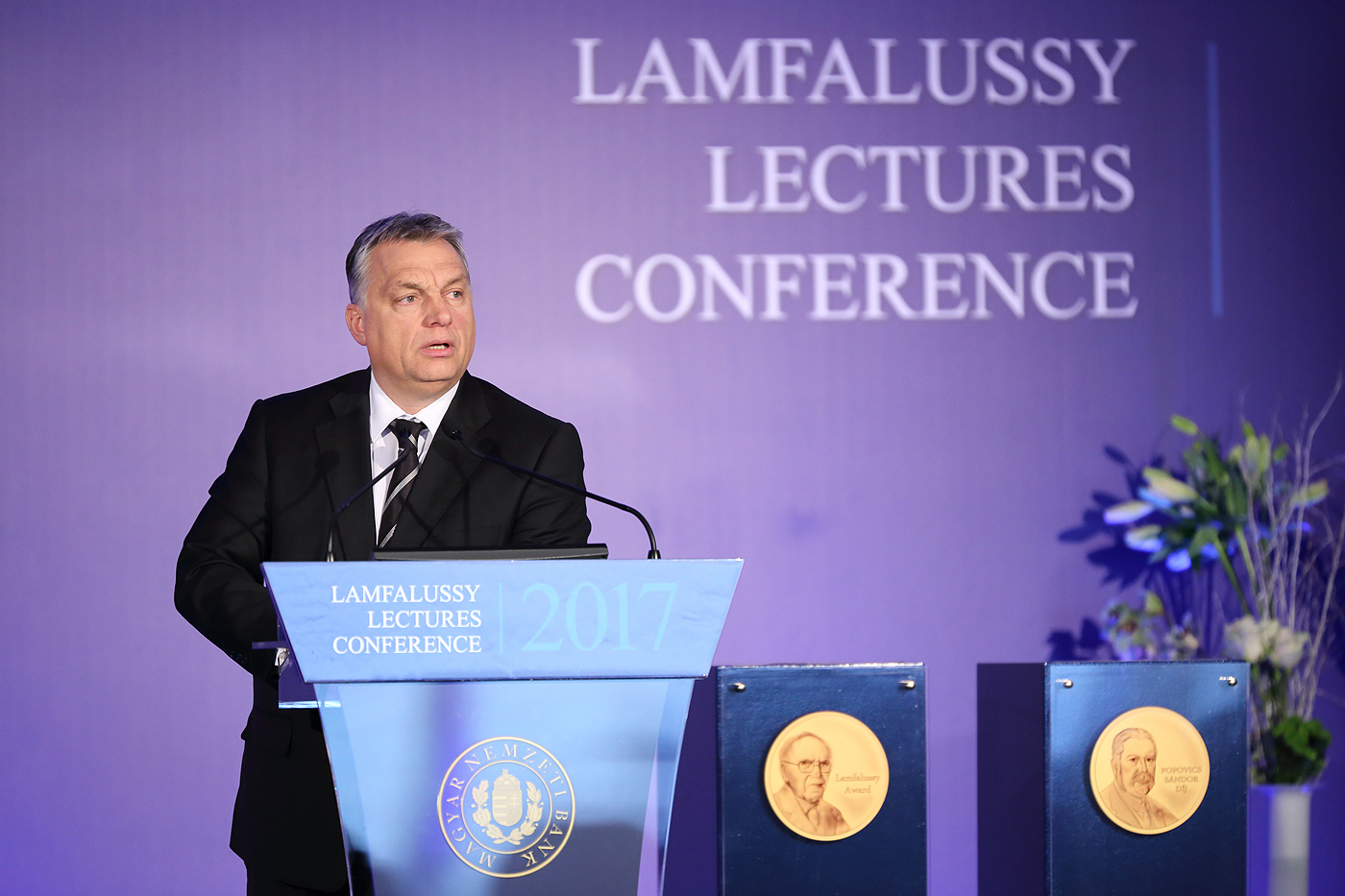
The panel meeting held in the morning, moderated by Dániel Palotai, Executive Director and Chief Economist of Magyar Nemzeti Bank, discussed the topic of “Can the Silk Road Tune up Growth? Opportunities in the European-Asian Economic Cooperation”. It was also about the future of the European integration.
Dr. CHEN Zhimin, Dean and Professor, Fudan University presented the “New Silk Road” concept and the three-level commitment of China to Europe. These three levels are: the level of the state, the subregional level and the level of the European Union. In his opinion, the essence of the “One Belt, One Road” initiative is the establishment of an economic network. We need projects aimed at creating connections: transport connections, connections between commercial and financial policies, connections between people. We need flexible agreements adapted to the local conditions.
Dr. YAN Xuetong, Dean and Professor, Tsinghua University explained that in his opinion bilateral agreements are easier to conclude than multilateral ones. Cooperation extends not only to the economy, it should also focus on politics, security and culture, otherwise its effects will be limited. Cooperation at the level of the state is not enough, it is also important that relations be established in the private sector. Countries should not and cannot copy the models of other countries, because they are so different. In the Chinese - Hungárián cooperation, Hungarians are able to retain their characteristics and their uniqueness. The experience of foreign countries should be utilised in such a manner that we should convert them in a way suitable for our own country, nothing should be adopted as it is.
Senior economist Erik F. Nielsen, Group Chief Economist, Global Head of CIB Research, UniCredit Bank AG noted that in the majority of the euro zone per capita GDP growth is still similar to that of the USA. Naturally, the euro zone has its own problems, as do other countries. He considers the Chinese initiatives to be a great idea, for a number of reasons, including the support provided by the initiative to the growth of investments in the public sector. This is one of those areas where countries of West Europe are rather weak, especially in the build-up of infrastructure between states. This initiative should also be welcome because it strengthens competition. He highlighted the role of the private sector in the cooperation with China. He emphasised that he fully respects and admires China for the results it has accomplished over the last 40 years, especially in the field of growth and the elimination of poverty and privation on the largest scale ever. In addition, it has also seen amazing development in the field of tools and institutions of governance.
After that, Ivo Maes, Senior Advisor, National Bank of Belgium and Robert Triffin Chair, Catholic University of Louvain reviewed the book “Alexandre Lamfalussy - Selected Essays” he edited and presented the professional career of Sándor Lámfalussy.
The title of the discussion forum of the panel moderated by Jacques de Larosiere was: “The future of European integration. What are the centrifugal forces threatening it and what should be done about it?”.
Sir Paul Tucker, former Deputy Governor of the Bank of England raised the following issues in his discussion opening speech: the banking union, the monetary union, the capital market union and the institutions of the EU. He noted that it was important to ensure that the legislation of the Union should be in accordance with the values and interests of the given member state. The establishment of the banking union is a great accomplishment, but it should have been created much earlier. At the same time, it cannot be deemed completed. For example, the European deposit insurance system is missing, which would be a precondition for financial stability. In addition, a certain degree of fiscal union is also necessary. Several options may exist for a way out of the fundamental competitiveness problem: 1. German wage inflation should significantly exceed the level of the countries of the periphery, 2. a significant transfer of resources should take place from Germany and the Nordic countries towards the southern countries, 3. some countries should leave the euro zone.
The capital market union could improve the operation of the euro zone by assigning the risks to the private markets, and let them price the incurred risks.
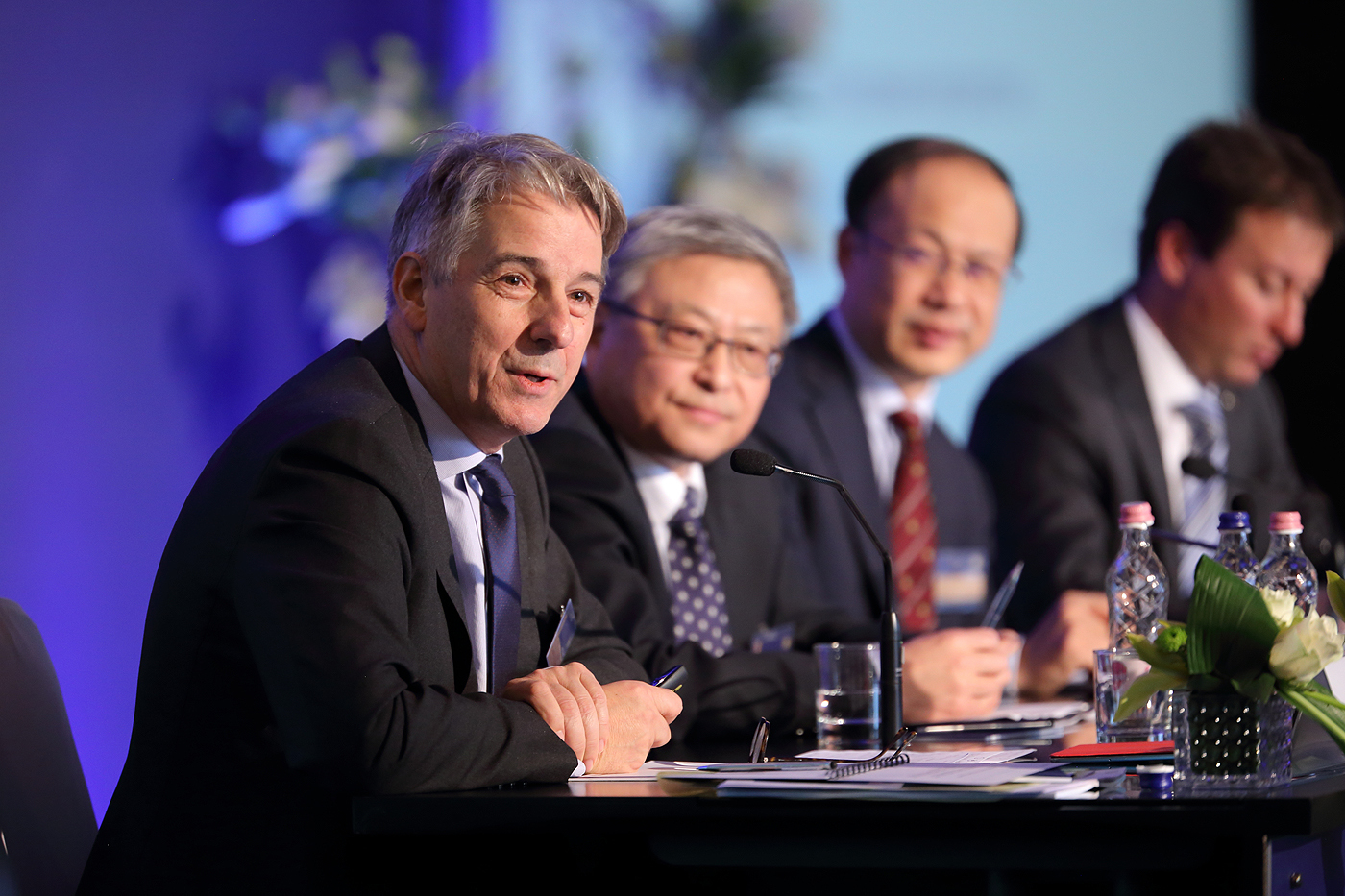
Paul De Grauwe, Professor, John Paulson Chair in European Political Economy at the London School of Economics and Political Science, shared his thoughts on the future of the euro: the euro zone is characterised by low growth and high unemployment, the system was already developed wrongly in the stage of design. The solution is a political and budgetary union and a kind of consolidation of national debts. Fiscal policy should focus on government investments, since the austerity programmes have so far led to a drop in government investments. Germany in particular should launch more investments of this kind, since it can practically finance itself at no cost. It is difficult to understand why the governments are unable to find investments whose return rate exceeds 0 per cent. A kind of integration “fatigue” can be felt, and although the political union seems far away, small steps should be taken in this direction.
Thomas Mayer, Founding Director, Flossbach von Storch Research Institute, gave a presentation with the title of “Future of European integration - centralisation is dividing Europe”. He sees two major problems: the lack of efficient control on the Schengen borders, and the euro as the only currency of the euro zone. Upon its birth, the euro was provided with two characteristics: 1. Commodity money (means for exchange and store of value); 2. State money (financial instrument, the central bank is the Lender of last resort not only for banks, but also for governments). It must be decided which of the two is the real identity of the euro.
Europe needs a more modest vision of the future: the EU can only be created as the political community of several distinct nations, in such a manner that fundamental sovereignty is retained at national level, certain areas should be delegated to Union level, and various circles of integration should be established in European Union.
György Szapáry, Chief Adviser to the Governor of Magyar Nemzeti Bank, said that now is the first time in the history of the Union that the Union is divided by multi-dimensional political issues, as well as non-technical economic issues, such as the Maastricht criteria, financial requirements, which have generated complex and time-consuming disputes but did not create such a deep division. He spoke about migration, Brexit, Russian sanctions and the issue of Turkey. He highlighted that the FX rate agreements preceding the euro had been worse than the euro. For the European economic integration to be strengthened, we need responsible governments and stronger institutions that honour the rules.
György Matolcsy closed the conference by stating that Hungary intends to continue acting as a bridge between Europe and Asia in the future as well, in which the Lámfalussy Conference is an important station. Several valuable thoughts have been stated and many important questions have been raised, which we can respond to together.
Report on the 2016 conference
This year the Lamfalussy Lectures Conference was organised for the third time with the participation of more than 400 guests. This year's conference was also a commemorative conference, where the central bank paid tribute to the oeuvre of Alexandre Lamfalussy, who passed away in 2015.
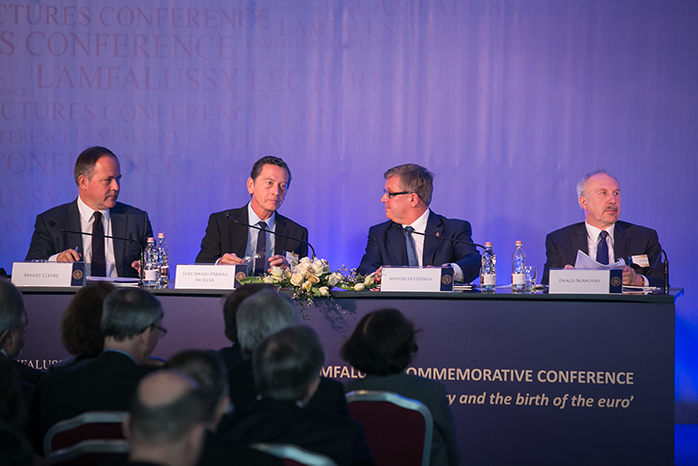
Opening address by György Matolcsy, the Governor of the Magyar Nemzeti Bank
In his presentation – which followed the welcome of all invitees – György Matolcsy pronounced: it is primarily the financial stability and the implementation of structural reforms that may lead to sustainable growth globally. The Governor of the central bank reported: a few weeks ago, at an Asian economic forum almost all lecturers talked about the market turbulences experienced in the beginning of the year and emphasised that at present all major centres of the global economy were ailing, thus there was no real growth driver. He believes that the key message of the event on Monday is that financial stability is of key importance in the global economy. The Governor of the MNB is of the opinion that we could learn from Alexandre Lamfalussy that economic instability easily leads to crisis, thus there is no other way to achieve sustainable growth than through financial stability accompanied by structural reforms.
Presentation of Luiz Awazu Pereira da Silva, Deputy General Manager of BIS: Old and new challenges for 2016 and beyond
The present volatile environment and the low growth are attributable to the lack of confidence. The markets are still uncertain about what the sustainable growth rate and appropriate level of risk-taking are. The market has anchored and even the smallest rumour has an immediate paralysing impact – he said. About the appropriate level of lending the brasil economist said: One of the greatest concerns of Alexandre Lamfalussy was how to control the great upswings, i.e. the credit booms. Capital requirements and prudential regulation are essential and also suitable for keeping the functioning of the economy under control – the economist said.
Presentation of Ewald Nowotny, Governor of the National Bank of Austria: From Euro to banking Union – what can we learn from Mr. Lamfalussy?
Ewald Nowotny – citing Alexandre Lamfalussy – emphasised: crises reveal the need for brave reforms. He added: Professor Lamfalussy, as the inventor of the concept of macroprudential supervision, made it clear that integrated financial markets must be confronted with integrated regulation. The Governor of the Austrian central bank identified financial volatility and poor economic growth as the greatest challenges. In his opinion the Central and Eastern European countries – among the Hungary – have weathered the financial crisis comparatively well, while the quantitative easing by ECB has had a positive impact on economic growth, but it would have been even more effective if fiscal policies had moved in the same direction. According to Nowotny, the extra-euro area states must be convinced of the advantages of the banking union. Among the positive features of a banking union he mentioned the access to the future common fiscal backstop mechanism, more and better information on banks, an improved quality of supervision and increased confidence in the international and national banking systems.
Presentation of Benoît Coeuré, Board Member of the European Central Bank: Towards completing economic and monetary union
The European integration must be carried further and there must be a political strategy for the deepening of the integration to achieve the sustainability of the European Economic and Monetary Union – said the French economist. He mentioned that the global challenges such as migration, terrorism and the climate change should foster closer cooperation among the Member States. The fact that Europe is often unable to take a uniform line in certain questions scares the public and the markets. If the Member States manage to take action together on one issue, it may help cooperation in other cases as well – he said. He emphasised: sustainable economic convergence cannot work without political convergence; however, at present there is no consensus among the Member States on the objective of the monetary policy, thus they also fail to observe the common rules. Integration should not continue as a technical and technocratic exercise, but rather it is time for political leaders to take up the baton.
Presentation of Jan Smets, Governor of the National Bank of Belgium: Navigating in uncharted waters, Alexandre Lamfalussy. The euro and a genuine Economic and Monetary Union
According to the Governor of the Belgian central bank the crisis clearly showed that stronger integration and institutional reforms are needed in the euro area to avoid problems such as in the case of Greece or any other countries that needed a bailout. The expert emphasised: a risk diversification mechanism is required, which helps jointly manage the shocks hitting individual members. There are two types of states in Europe: the small ones and those that have not yet realised that they are small. That is, the countries of Europe can no longer succeed separately, we are dependent on each other – he added in the end.
Presentation of Edmond Alphandéry, former Minister of Economy of France What lessons from Greece can be drawn for EMU?
The chairman of the Euro50 Group recalled that the Greek debt crisis could cause such a great excitement, because the EU was unable to handle the severe disparities among the countries of the currency union. He reminded: in the first years of the euro area the investors had strong trust in the less affluent states, and this was mostly attributable to the simple fact that they were members of the currency union. However, as soon as the crisis has set in, financial investors started to flee from the countries struggling with high deficit. And this generated a fatal spiral: the financing of the debt that was too high from the outset anyway, became more and more expensive – in the case of Greece practically unsustainable – due to the increasing risks.
Presentation of Klaus Regling, Managing Director of the European Stability Mechanism (ESM): Lessons from the Euro crisis
Although Hungary is not the member of the euro area, it has already made a major contribution in the person of Alexandre Lamfalussy – said the managing director, who also mentioned that a number of lessons had been learnt from the crisis; the monetary union, as well as the European banking system and the fiscal solidarity among the countries of the European Monetary and Economic Union (EMU), became stronger after the crisis. He emphasised: the euro area states must avoid excessive macroeconomic imbalance and in parallel manage their government debt. Clearly, the countries must push the general government deficit below 3 per cent – he said. He believed that the active monetary policy must be continued, taking the activity of the ECB as an example.
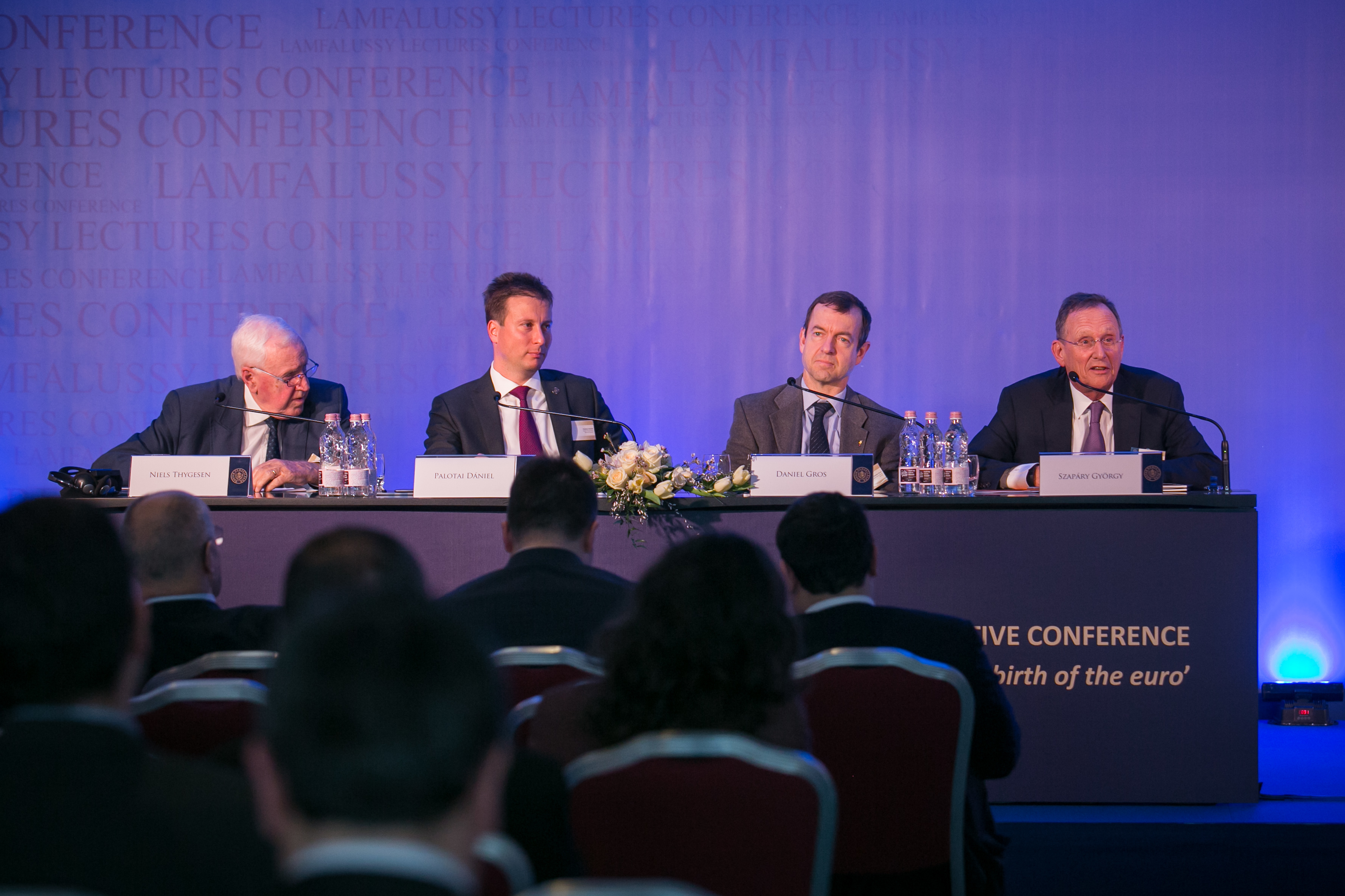
Panel discussion
Moderator: György Szapáry, Ambassador, Chief Advisor to the Governor of the MNB
Participants:
- Daniel Gros, Director of the Centre for European Policy Studies
- Dániel Palotai, Executive Director and Chief Economist of the MNB
- Niels Thygesen, Professor Emeritus, University of Copenhagen
Dániel Palotai said: the difference between the financial crisis of 2008 and previous crises was that the small open economies were not in the position to "export themselves" out of the crisis, as all countries faced similar challenges. He pointed out: the Hungarian government recognised the fact that it was not possible to recover from the crisis without growth, thus the primary objective was to achieve economic growth. In 2013 the European Union lifted the excessive deficit procedure against Hungary due to achieving economic growth and macroeconomic balance simultaneously – he added. At present the MNB base rate is such that nobody would have imagined a couple of years ago, and the Monetary Council believes that this level has to be maintained at least until the end of 2017 – he declared. Dániel Palotai reported that the MNB managed to pursue a profitable operation without jeopardising the inflation target and it did not need to rely on the assistance of the central budget. The market recognises the performance of the Hungarian economy, however this not the case with the international rating agencies yet; nevertheless, they should also bear reality in mind – he noted.
According to Niels Thygesen, Professor Emeritus of the University of Copenhagen, in the beginning of the '90-ies the political decision-makers decided on the establishment of the monetary union just at the right time. He pointed out: although there were great uncertainties – mostly due to political reasons – the ultimate argument was that it was just about time to create a single market in Europe. He noted: then not only the business actors, but also the trade unions were arguing for a single market and a single currency as the means to preserve high wage levels in Europe.
Daniel Gros, Director of the Centre for European Policy Studies, said: the European financial system is built on the banks, and low interest rates are essential for giving a boost to the economy. By contrast, in the United States capital market funding takes the primary role. According to the economist, in Europe the interests of the national states differ during the quantitative easing launched by the European Central Bank (ECB) and he believed that lenders would lose, while debtors would benefit from it.
In his conference closing speech György Matolcsy emphasised: a consensus was reached among the lecturers of the conference with regard to the urgent need of political stability and structural reforms in the euro area to promote the further development of the monetary union. The tax regime is unsustainable in several EU Member States, there are two-digit unemployment rates and missing confidence – he said. He believes that the EU states should develop a new framework, regain trust and implement brave structural reforms.
Report on the 2015 conference
After welcoming all invitees György Matolcsy stated in his presentation: Now, as the European Central Bank has launched its monetary policy programmes, Europe needs a new narrative. The Governor stated that in 2010 the new Hungarian government had to face the dilemma of choosing between orthodox or unorthodox measures to manage the crisis. He believed that using only conventional measures would have destined Hungary to fail; successful crisis management needed three elements: structural reforms, new jobs and political stability.
Presentation of Benoît Coeuré, Board Member of the European Central Bank: Monetary policy in a genuine European Monetary Union
The further integration of the European Economic and Monetary Union – commonly known as the euro area – and the deepening of the monetary union is inevitable – said Benoît Coeuré, Board Member of the European Central Bank. If the fiscal policy, together with the government debt, is not constrained, and also if the fiscal policy is inefficient, all parties will lose out, as such debts may accumulate that generate immense problems in certain countries. The French financial expert believes that it was unavoidable to strengthen the banking supervision role of the ECB. Based on its broader powers as a supervisor, the ECB will be able to uncover weak banks, which helps reduce the risk of financing so-called “zombie banks", thereby strengthening the operational efficiency of the banking system – he pointed out.
Presentation of Ewald Nowotny, Governor of the National Bank of Austria: CESEE 25 years after the fall of the iron curtain – European integration remains a win-win strategy - video of the presentation
Ewald Nowotny, the Governor of the National Bank of Austria conferred at the conference about the huge transformation that the eastern and southern regions of Europe have undergone in the last 25 years. Many investors – particularly those from the US – have not recognised this fact to date and treat the countries of the region uniformly as the "developing European" portfolio, despite the fact that there are major differences between the economic situation of even two neighbouring countries - stated Nowotny.
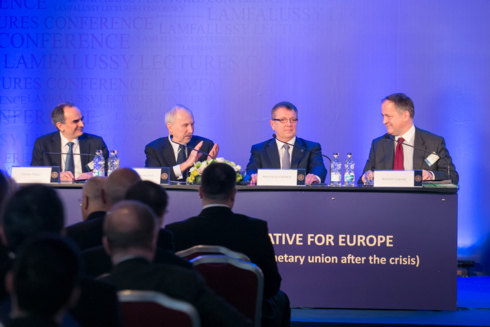
Presentation of Erdem Başçi, Governor of the National Bank of Turkey: On the value of price stability
Erdem Bas¸çi, the Governor of the National Bank of Turkey, elaborated on the importance of inflation management – at the Lámfalussy Conference. He emphasised that there were wide-ranging and well-known instruments to crusade against high inflation. On the other hand, it is less obvious how to manage deflation, i.e. the economic phenomenon that at present threatens the European economy the most. The Governor of the Central Bank of Turkey is of the opinion that a central bank can do the most for the benefit of its country's economy by ensuring stability in any case.
Presentation of Carlos da Silva Costa, Governor of the National Bank of Portugal: Reform and prosperity in the monetary union
Carlos da Silva Costa, the Governor of the National Bank of Portugal, made a presentation on the risks of the various measures. He emphasised the responsibility of the economic experts in developing sustainable measures that do not lead to social conflicts within 6-7 years. He also pointed out: the reforms to be implemented in the European economies will have an unfavourable impact on the EU member states that are slow to react.
Presentation of Boštjan Jazbec, the Governor of the National Bank of Slovenia: On the effectiveness of non-standard monetary policy measures in Slovenia
Boštjan Jazbec, the Governor of the National Bank of Slovenia, recalled Slovenia's experiences and the lessons learnt from the introduction of euro in 2007. On the one hand, he considers it as a lost opportunity that a vast part of the capital that poured in at that time was not used properly, the weight of which is still felt by Slovenia. Since then they have learnt how to "utilise other people's money" efficiently. The Governor of the Slovenian central bank mentioned as an interesting point that state ownership in the Slovenian Banking sector had been high from the outset, therefore at present they were contemplating privatisation.
Presentation of Boris Vujčić, the Governor of the National Bank of Croatia: Crisis and central banking paradigm
Boris Vujcˇic´, the Governor of National Bank of Croatia illustrated on the example of Croatia that – contrary to the textbook example – it is possible to pursue an anticyclical monetary policy even in a small open economy with fixed level of interest rates. However, he also emphasised: this alone is not much, if no other structural measures – belonging to the government's competence – are taken, as the central bank's powers are limited.
Presentation of Erkki Liikanen, the Governor of the National Bank of Finland: The independence of monetary policy and the banking union
Erkki Liikanen, the Governor of the National Bank of Finland, was also concerned about the threat that the governments of the member states may interpret ECB's bond purchase programme as a measure that relieves them of introducing the necessary reforms. At the same time he also urged closer integration that would entail the development of a new and stricter regulatory framework, which may help avoid that the currently available liquidity flows to risky areas, e.g. contributing to another property market bubble.
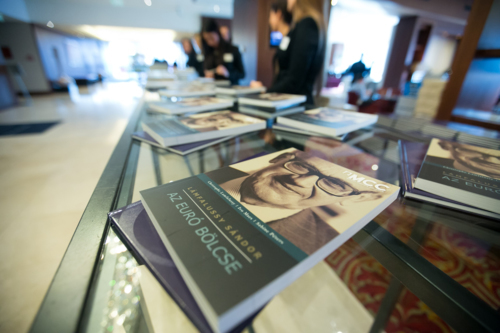
Panel discussion
Moderator: Csaba Lentner, professor
Participants:
-
-
Agnes Bénassy-Quéré, Professor CES, Centre d'Economie de la Sorbonne
-
Dániel Palotai, Executive Director of the MNB in charge of monetary policy
-
André Sapir, University Professor, Université libre de Bruxelles
-
György Szapáry, Ambassador, former Deputy Governor of the MNB
-
Dániel Palotai, the executive director of the MNB said at the panel discussion of the conference: if the large central banks continue the quantitative easing, the Hungarian monetary policy will also have wider room for manoeuvre. Dániel Palotai emphasised: One of the key duties in Hungary is to integrate the small- and medium-sized enterprises (SME) tighter in the global production chains. Roughly two-thirds of the employees work for SMEs, therefore it is extremely important to make as many Hungarian SMEs as possible to become the suppliers of large multinational enterprises – he pointed out.
André Sapir, a teacher of Université libre de Bruxelles – who also used to be the advisor of two former chairmen of the European Commission – stated: it is a correct, albeit somewhat belated, decision of the European Central Bank (ECB) to commence on the quantitative easing (QE) as the last one of the world's large central banks. Under the present circumstances unconventional measures, such as the ECB's asset purchase programme, are unavoidable – he said.
György Szapáry, former Deputy Governor of the MNB, noted: as regards the accommodating monetary policy of the world's large central banks it is to be feared that the present abundance of liquidity may lead to an asset price bubble over time.
Closing summary by György Matolcsy the Governor of the Magyar Nemzeti Bank - video of the closing speech
In his closing speech György Matolcsy, Governor of the central bank, recalled the remark of Ewald Nowotny, Governor of the Austrian central bank, according to which the present circumstances require unconventional thinking from the central banks' managers. In his closing remark he thanked the participating lecturers for raising the professional quality of the Conference with their presentations.
Report on the 2014 conference
After a brief welcome by György Matolcsy the year 2014 Lámfalussy Lectures professional conference commenced with the presentation of Viktor Orbán on the dilemma of the introduction of the euro. The Governor of the Hungarian central bank announced already at the start of the event that the first awardee of the Lámfalussy Award, established a year ago, was Ewald Nowotny.
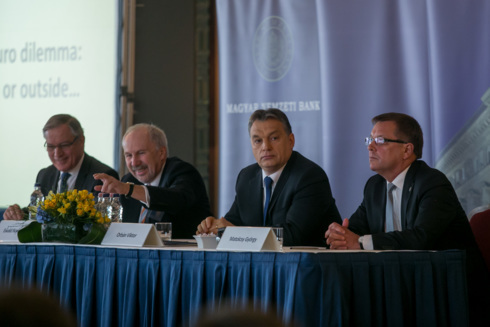
Opening address of Prime Minister Viktor Orbán
The prime minister stated that the government and the central bank had to cooperate, but there must be a clear-cut segregation of powers on the base rate and exchange rate issues. Namely, he emphasised that these belong to the sole competence of the central bank. The prime minister urged a new European Union strategy necessary for competitiveness, which – in his view – requires the financial stability of the euro area, as well as the providing of the extra-euro area countries with the fullest economic policy freedom. The prime minister is of the opinion that Central-Europe may become the engine of the European Economic Area's growth; however, this requires the maintenance of the strong ties to the German economy in the future as well. In his view the concentration of powers is also essential for the position of the engine of growth. As an example he mentioned the Austrian and the German grand coalition, as well as his government's two-thirds majority, in the absence of which the policy of renewal would have failed. Accordingly, in the end he encouraged the voters not to ignore the categories of political power and the ability to govern, as the successful or unsuccessful economic policy of the future governments may depend on this. As regards the accession to the euro area, being the main topic of the conference, Viktor Orbán said that first we should get closer to the euro area in the real categories of the economy to facilitate an "intelligent conversation" on the financial accession.
Presentation of Ewald Nowotny, the Governor of the National Bank of Austria: European Monetary Union: Past, Present and the Future
In his presentation the Governor of the Austrian central bank emphasised that the relationship between the Austrian and the Hungarian central banks was tight, but – as he stated – a tight relationship is not necessarily a simple one as well. As he mentioned, in the recent past the two central banks faced a few difficult issues, but none of those were a matter of principle, but rather a practical issue. "History teaches us that differences of opinion may exist, but we should never regard each other as enemies" – he said. Nowotny argued in favour of the multi-speed Europe: it must be facilitated at least in the medium term that the able and willing member states make a progress and tighten the cooperation. As the member of the Governing Council of the ECB he stated: the ECB played a major role in fending off the effects of the economic crisis. As he stated, without the intervention of the ECB the consequences of the crisis would have been even more disastrous not only in the euro area, but also in the EU member states outside the euro area.
Presentation of Christian Noyer, the Governor of the French central bank: Why the Economic and Monetary Union needs a banking union
According to the Governor of the French central bank one of the most important lessons learnt from the past period is that the European Union was not perfect and coherent. The problems occurred in the heart of the euro area. In his opinion the creation of the European Banking Union will immensely improve the transparency of the large European banking groups and at the same time also strengthen the consistent and clear management of the potential bank resolutions.
Presentation of Ilmars Rimsevics, the Governor of the Latvian central bank: Latvia and the Euro
Latvia is once again the fastest growing country in the region and it was able to perform so earlier as well – said the Governor of the Latvian central bank. As he said, the sceptics also often add that Latvia grows fast indeed, but has to pay a huge price for that. Rimsevics believes that his country has already regained the previous output level, thus it can be stated that the introduction of the euro in Latvia and the accession to the euro area was clearly advantageous for Latvia. The credit rating agencies upgraded the rating of the country already upon the announcement on the joining to the euro area; on the other hand, it is an unquestionable fact that at the start of the crisis Latvia had the lowest government debt, while now it is above 40 per cent. And this is certainly a very important aspect, and as such they will focus on this in the coming period – said Rimsevics.
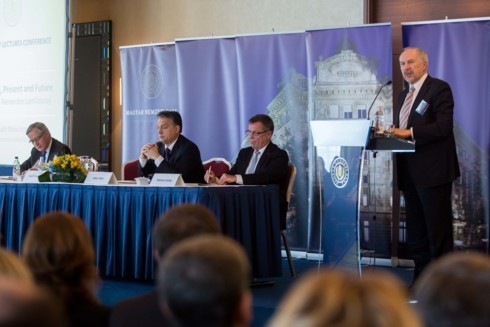
Presentation of György Szapáry, Ambassador of Hungary to the United States, former Deputy Governor of the Magyar Nemzeti Bank: Central bank responses to the crisis, what are the risks of exit
The central banks assumed a risk with the monetary expansion, but perhaps the risk "idleness" was even higher – evaluated György Szapáry the central bank's recent reactions. He talked about the change of the monetary policy direction seen in the major central banks of the world (particularly at Fed) and the related risks, and noted that in his opinion the shrinking liquidity may once again entail an increase in the money- and capital markets' aversion to risk.
Convergence and Adjustment in the European Monetary Union – José Luis Malo De Molina, Director General of the Spanish central bank
In connection with the competitiveness processes the Governor of the Spanish central bank noted that finally the situation in Spain was improving and there was also some progress in wage competitiveness. At the same time he acknowledged that the adjustment demanded a huge growth sacrifice from them and the 26 per cent unemployment rate was extremely worrying.
These issues must be addressed in a timely manner, otherwise new problems may surface – believes De Molina.
The Euro from the Russian perspective – Igor Dmitriev, Director of the Russian central bank
Since its creation the euro has played a very important role in the economic interaction of the entire world, with Russia not being an exception – emphasised the Director of the Russian central bank in the beginning of his speech. The euro area is one of the most important trading partners of Russia, and this was not changed by the recent crisis either; moreover, the euro also has a prime position in the structure of the Russian external debt – stated the Russian central banker, thereby emphasising the impact of the euro area's monetary policy on Russia.
However, compared to these very strong economic relations – which he listed in length – the international relations are rather weak – established Dmitriev as a closing remark.
In his closing speech György Matolcsy emphasised the importance of the central bank independence and summarised the lessons of the conference. In his opinion the relations with Russia must be redefined, especially in the area of energy supply, and the economy policy badly needs not simply reforms but innovations. In his view at present Europe may appear to progress at multiple speed, but the period of convergence will come – he finally stated.
SPEAKERS
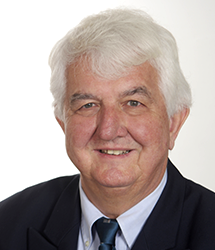
Robert Holzmann
Governor, OeNB

H. E. Chea Seray
Assistant Governor, NBC
